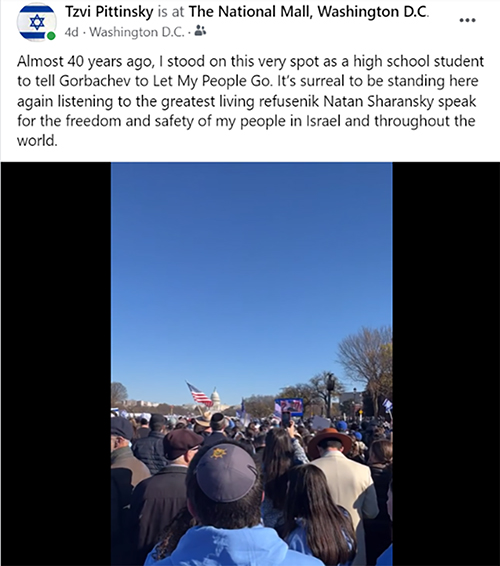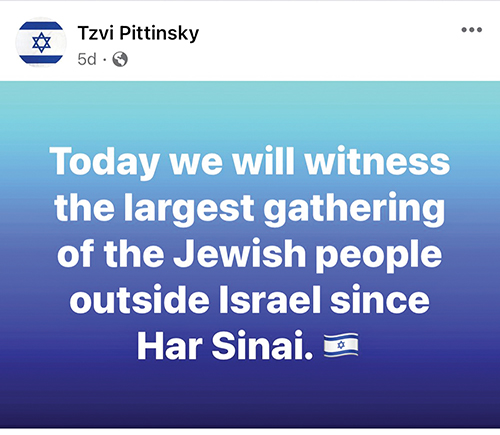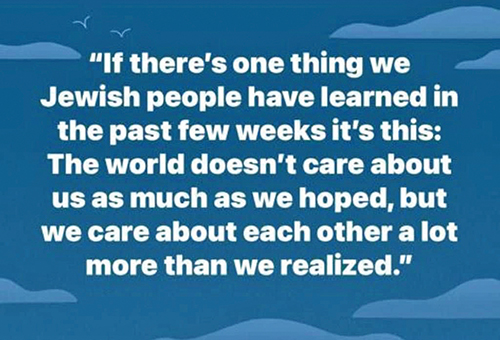
These past few weeks, I have been haunted by the words of Avraham Avinu while hondling over the purchase of a burial plot for his wife Sarah: גֵּר־וְתוֹשָׁ֥ב אָנֹכִ֖י עִמָּכֶ֑ם, I am a stranger and a sojourner with you (Bereishit 23:4).
I remember the sermon by the dean of Yeshivat Shaalvim when I was learning there some 30 years ago. Rav Mallen Galinsky exclaimed over and over again, “Which one are you? Are you a ger? Or are you a toshav? Are you a stranger? Or are you a sojourner?” He quoted the interpretation of Rav Yosef Dov Soloveitchik that the Jew can never forget that he is both a ger and a toshav. In some ways, he is a toshav, a resident. A citizen of the country he lives in, sharing with them a concern for society and contributing to his country’s politics, science, business and culture. But at the same, the Jew can never forget that he will always be a ger. A stranger with a different religious outlook and moral code than the rest of the world. We are not the same. From the time of Avraham HaIvri, who was willing to fight alone against the values of the ancient world, כָּל הָעוֹלָם כֻּלּוֹ מֵעֵבֶר אֶחָד וְהוּא מֵעֵבֶר אֶחָד, the entire world on one side and he on the other side (Bereshit Rabbah 42:8).
For me, and I believe for most of us living in the United States, what Rav Moshe Feinstein, zt”l called a מלכות של חסד, a government of kindness, we have always felt like the toshav, equal citizens in our country. This has been especially true for the Jewish teenagers I teach daily who, while committed to a Jewish life, identify culturally with their American neighbors, listening to the same music, watching the same TV and movies, and sharing the same TikTok videos as their non-Jewish counterparts. Many go to secular universities, choosing those with a strong Jewish life on campus, so they can partake in the entirety of the American experience while clinging to their Jewish identity. The fact that we are also a ger, a stranger in a land that is not our own, has been distant from our minds. Until now.
The horrible atrocities perpetrated by Hamas and the war that has resulted from this has strengthened our identification with our brothers and sisters in Israel. But unfortunately this is relatively common, even in the memory of our teenagers, as there have been many Israeli military actions against the forces of terror in the past decade. But never before in my lifetime have these actions spilled over into a worldwide antisemitism that has personally affected us.

It first started in the ivory tower of the Ivy League where our best and brightest go to further their commitment to Western knowledge and ideals. As these demonstrations became violent, with calls for Jewish genocide, many of us still felt like these were isolated occurrences. I remember a conversation I had a few weeks ago with a college guidance counselor from my school. I told him that Cooper Union, the alma mater of my mother, father and my son, would not be subject to these demonstrations since the students were math and science nerds too concerned about their calculus presets to have time for such extreme politics. And that very night, I watched in horror videos of Jewish students at Cooper Union locked in the library while an angry mob banged on the doors. Over and over again, I and my teenage students have been reminded through the activities on almost every non-Jewish college campus, that we are the ger, the other, a stranger in this goldener medina (how European refugees referred to the U.S. after WWII), with many cheering for our destruction.
This has not been limited to the college campus. Many of my friends to the political left, observant Jews who are also committed to social justice, who marched for the rights of the downtrodden in our country, have found in our time of need that these very groups have abandoned them. They are political orphans, their only crime being their advocating for their right to exist and the right to exist for their Jewish brethren as well. And my friends on the right have equally been disillusioned by those who were the darlings of the right wing media who now have equivocated, blaming the Jews instead of coming to our defense.
At the same time, our knowledge that we Jews are strangers in our country, has led us to come together as never before. This past week, I was privileged to march with my students at the rally in Washington where we were joined by 290,000 mostly Jewish brothers and sisters from every religious stream of Judaism.
I have attended two similar rallies in the past but this one felt different. In 1987, when I was a high school student myself, marching on Washington to tell Gorbachev to let my brothers and sisters in the Soviet Union go, it felt like we were intimately aligned with the entirety of the American populace. While the Jews in the Soviet Union might have felt like strangers in a strange land, virtually all of our non-Jewish neighbors in the United States identified with the values of freedom for which we were advocating. Then in 2002, when I led students on a March for Israel in the midst of the second intifada in April of 2002, it was so close to our own tragic experience with terrorism in the U.S. on 9/11, that almost all Americans closely identified with the Jewish experience in Israel.
This time it was different. Yes, many politicians from across the political spectrum spoke on behalf of Israel and against antisemitism during last Tuesday’s rally. An especially surreal moment for me was watching former Soviet refusenik Natan Sharansky, whose freedom I rallied for so many years ago, addressing the crowd about world-wide antisemitism.
But after the rally was over when I scanned the news outlets for coverage of perhaps the largest gathering of Jews outside Israel since Har Sinai, I found barely a mention in mainstream media outlets like The New York Times and Washington Post. It was as if since this rally did not fit the narrative of Palestinian “oppression” by Israeli “oppressors” which they wished to portray, coverage of the rally was downplayed and ultimately erased in the same way they seek to erase the Jew from the American scene. Once again, even after such a large and inspirational gathering, we felt like the ger, the stranger, no longer a welcome citizen of the country we call home.

So what are we to do? These past weeks have strengthened in me the truth that Israel is our ultimate home. But at the same time, it has shown a path to the role for us who remain for the time being in the diaspora. We are to continue to join together as a people, b’achdut, unified in our support of our Jewish brothers and sisters in Israel, America and throughout the world. As social media influencer Hillel Fuld posted recently, we, the Jews of the U.S., Israel and the world, have discovered in these weeks that we care about each other much more than we ever realized.
Until the messianic age, we will forever be both the toshav and the ger. We can continue to use our positions as citizens of the United States to be a beacon in every area in which we choose to participate. But at the same time, we will forever be the ger, the stranger in this land. Sometimes needing to stand alone for the morals and values we hold dear in a topsy turvy world. We are not the same. We are the chosen people with a mission to be a light for the world.
Rabbi Tzvi Pittinsky is the director of educational technology at Yeshivat Frisch in Paramus. He is also the author of the Parsha Memes that appear weekly in The Jewish Link. You can email him at [email protected].












